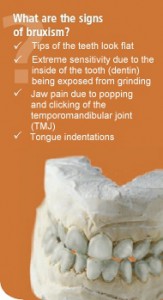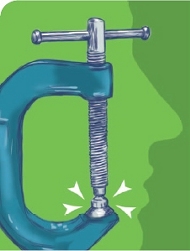What Exactly Is Bruxism?
Bruxism is the technical term for teeth grinding and clenching that causes facial pain. People unintentionally bite down too hard at inappropriate times, such as in their sleep. In addition these bruxers may also may bite their fingernails, pencils and chew the inside of their cheek. People usually aren’t diagnosed with bruxism until it is too late because so many people don’t realize they have the habit. Others mistakenly believe that their teeth must touch at all times.
Who suffers from bruxism?
Bruxism is triggered by people with certain types of personalities. They may have a nervous tension and a hard time handling stress. Anger, pain and frustration can cause people to start showing the beginning signs of bruxism with out them even knowing it. People who are aggressive, competitive and hurried also may be at a greater risk for bruxism.
 What are the signs of Bruxism?
What are the signs of Bruxism?
- Tips of the teeth look flat
- Extreme sensitivity due to the inside of the tooth (dentin) being exposed from grinding
- Jaw pain due to popping and clicking of the temporomandibular joint (TMJ)
- Tongue indentations
What can be done?
Your general dentist automatically checks for physical signs of bruxism and if it seems to be present the condition may be observed over several visits before recommending and starting therapy. The objective of therapy is to get the bruxer to change behavior by learning how to rest the tongue, teeth and lips properly. While simply becoming aware of the problem and changing their behavior may be enough for some people, others will have to wear a plastic mouth appliance, such as a night guard that’s worn to absorb the force of biting. This appliance can prevent future damage to the teeth and helps change the patient’s destructive behavior. Biofeedback is used on daytime grinders by using electronic instruments to measure muscle activity and to teach patients how to reduce muscle activity when the biting force becomes too great. Researchers are still experimenting with new ways to help those who tend to clench in their sleep.
